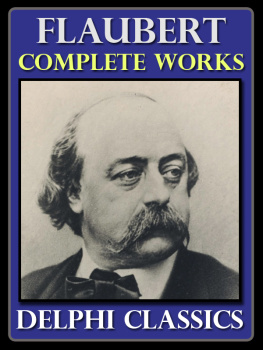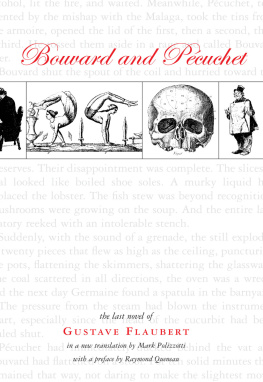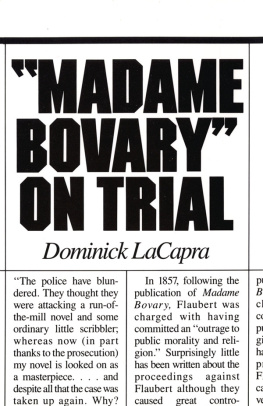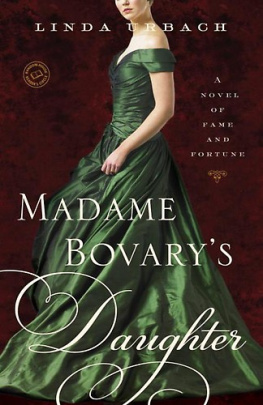[1]
We were in Study Hall, when the Headmaster entered, followed by a new boy dressed in regular clothes and a school servant carrying a large desk. Those who were sleeping woke up, and everyone rose as though taken by surprise while at work.
The Headmaster motioned us to sit down again; then, turning to the study hall teacher:
Monsieur Roger, he said to him in a low voice, here is a pupil I am entrusting to your care; he is entering the fifth. If his work and his conduct are deserving, he will be moved up to the seniors , as befits his age.
Still standing in the corner, behind the door, so that one could hardly see him, the new boy was a fellow from the country, about fifteen years old, and taller than any of us. His hair was cut straight across the forehead, like a village choirboys, his manner sensible and very ill at ease. Although he was not broad in the shoulders, his suit jacket of green cloth with black buttons must have pinched him around the armholes, and it showed, through the vents of its cuffs, red wrists accustomed to being bare. His legs, in blue stockings, emerged from a pair of yellowish pants pulled tight by his suspenders. He wore stout shoes, badly shined, studded with nails.
We began reciting our lessons. He listened to them, all ears, as attentive as though to a sermon, not daring even to cross his legs or to lean on his elbow, and at two oclock, when the bell rang, the teacher was obliged to alert him, so that he would get in line with us.
We were in the habit, when we entered the classroom, of throwing our caps on the floor, so that our hands would be free; from the doorsill, we had to hurl them under the bench, in such a way that they struck the wall, making a lot of dust; it was the thing to do.
But either because he had not noticed this maneuver or because he had not dared go along with it, after the prayer was over, the new boy was still holding his cap on his knees. It was one of those head coverings of a composite order, in which one can recognize components of a busby, a lancers cap, a bowler, an otter-skin cap, and a cotton nightcap, one of those sorry objects, indeed, whose mute ugliness has depths of expression, like the face of an imbecile. Ovoid and stiffened with whalebones, it began with three circular sausages; then followed alternately, separated by a red band, lozenges of velvet and rabbit fur; next came a kind of bag terminating in a cardboard-lined polygon, covered with an embroidery in complicated braid, from which hung, at the end of a long, excessively slender cord, a little crosspiece of gold threads, by way of a tassel. It was new; the visor shone.
Stand up, said the teacher.
He stood up; his cap fell. The whole class began to laugh.
He bent over to pick it up. A boy beside him knocked it down again with a nudge of his elbow; he retrieved it again.
Get rid of that helmet of yours, said the teacher, who was a wit.
There was a burst of laughter from the class that disconcerted the poor boy, so that he did not know whether he should keep his cap in his hand, leave it on the floor, or put it on his head. He sat down again and laid it on his knees.
Stand up, said the teacher, and tell me your name.
Stammering, the new boy articulated an unintelligible name.
Again!
The same mumble of syllables was heard, muffled by the hooting of the class.
Louder! shouted the teacher. Louder!
The new boy , summoning an extreme resolve, then opened an inordinately large mouth and bawled at the top of his lungs, as though shouting to someone, the word Charbovari.
Now an uproar exploded all at once, rose in a crescendo , with outbursts of shrill voices (they howled, they barked, they stamped, they repeated: Charbovari! Charbovari! ), then continued in isolated notes, quieting with great difficulty and sometimes resuming suddenly along the line of a bench from which a stifled laugh would start up again here and there, like a half-spent firecracker.
However, under a rain of penalties, order was gradually restored in the classroom, and the teacher, having managed to grasp the name of Charles Bovary, having had it dictated to him, spelled out, and read back, at once commanded the poor fellow to go sit on the dunces bench, at the foot of the platform. He began to move but, before going, hesitated.
What are you looking for? asked the teacher.
My c , said the new boy timidly, casting uneasy glances around him.
Five hundred lines for the entire class! The furious exclamation put an end, like the Quos ego , to a fresh squall. Now, keep quiet! continued the indignant teacher, wiping his forehead with the handkerchief he had just taken from inside his toque. As for you, new boy , you will copy out the verb ridiculus sum for me twenty times.
Then, more gently:
Come now! Youll find your cap; it hasnt been stolen!
All was calm again. Heads bent over satchels, and for two hours the new boys behavior continued to be exemplary, even though, from time to time, a pellet of paper fired from the nib of a pen came and splattered on his face. But he would wipe himself off with his hand and remain motionless, his eyes lowered.
That evening, in Study Hall, he drew his cuff guards from his desk, put his little things in order, carefully ruled his paper. We saw him working conscientiously, looking up all the words in the dictionary and taking great pains. Thanks, no doubt, to this willingness he displayed, he did not have to go down into the lower class; for while he knew his rules passably well, he had almost no elegance in his constructions. It was the cur of his village who had started him on Latin, his parents, for reasons of economy, having delayed as long as possible sending him to school.
His father, Monsieur Charles-Denis-Bartholom Bovary, a former assistant army surgeon, compromised, in about 1812, in some business involving conscription and forced, at about that time, to leave the service, had then profited from his personal attributes to pick up a dowry of sixty thousand francs, presented in the form of a hosiers daughter, who had fallen in love with his fine appearance. A handsome, boastful man, jingling his spurs loudly, sporting side-whiskers that merged with his mustache, his fingers always garnished with rings, and dressed in gaudy colors, he had the appearance of a valiant soldier, along with the easy enthusiasm of a traveling salesman. Once married, he lived for two or three years off his wifes fortune, dining well, rising late, smoking great porcelain pipes, coming home at night only after the theater, and haunting cafs. The father-in-law died and left little; he was indignant at this, went into manufacturing , lost some money at it, then retired to the country, where he intended to cultivate the land. But since he hardly understood farming any better than he did chintz, since he rode his horses instead of putting them to the plow, drank his cider by the bottle instead of selling it by the barrel, ate the best poultry in his yard and greased his hunting shoes with the fat of his pigs, he soon realized that it would be better to abandon all financial enterprises.
For a rent of two hundred francs a year, therefore, he found, in a village on the borders of the Caux region and Picardy, a dwelling of a sort that was half farm, half gentlemans residence; and there, morose, gnawed by regrets, railing at heaven, envying all the world, he shut himself away at the age of forty-five, disgusted with men, he said, and determined to live in peace.
His wife had been madly in love with him at one time; she had doted on him with countless slavish attentions that had estranged him from her even further. Once lively, expansive, and wholeheartedly affectionate, she had become, as she aged (like stale wine turning to vinegar), difficult in temper, shrill, nervous. She had suffered so much, without complaining at first, when she saw him running after every slut in the village and when a score of low-life places would send him back to her at night surfeited and stinking drunk! Then her pride had rebelled. She fell silent, swallowing her rage in a mute stoicism, which she maintained until her death. She was constantly out on errands, on business. She would go see the lawyers, the presiding judge, remember the due dates of the notes, obtain extensions; and, at home, she would iron, sew, wash, look after the workers, settle the accounts, while Monsieur, troubling himself about nothing, eternally sunk in a sullentorpor from which he roused himself only to say unpleasant things to her, sat smoking by the fire, spitting in the ashes.













